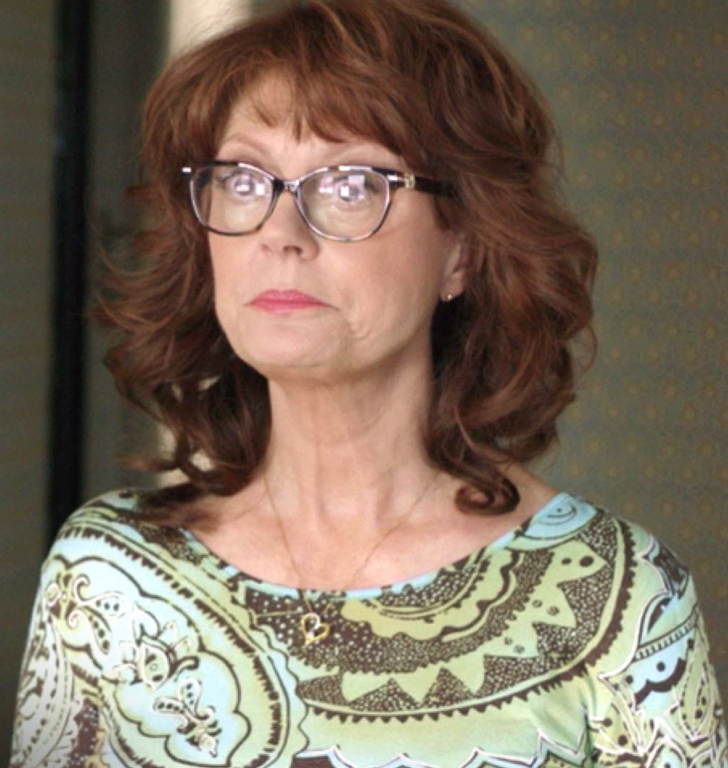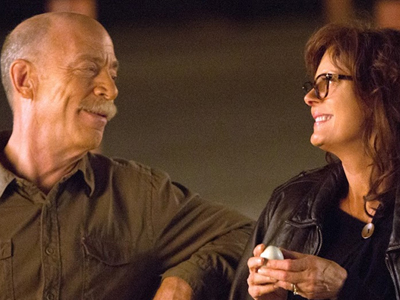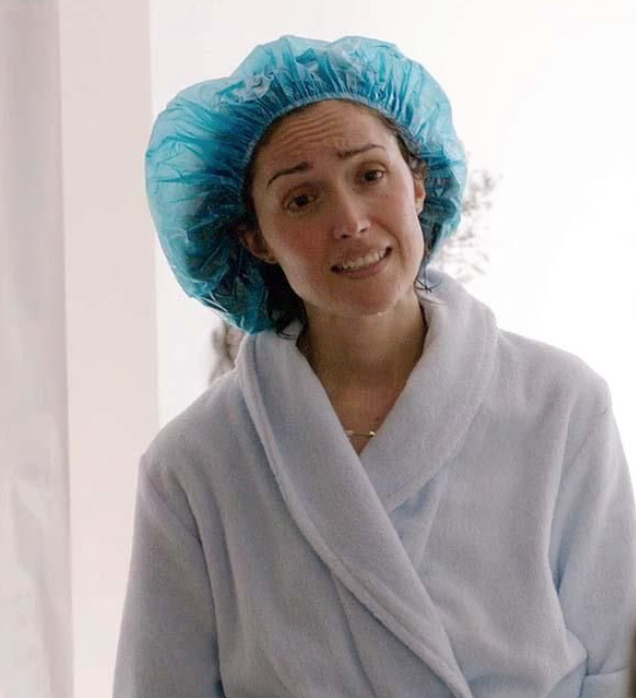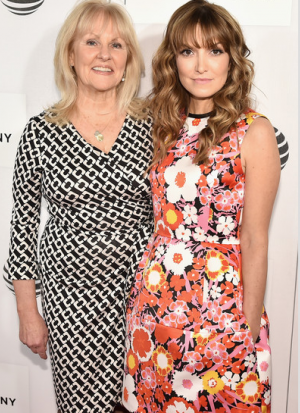 One of my favorite freelance gigs is giving talks to local cinema clubs. The groups mostly are comprised of people over 60, which is my preferred demographic of human beings. As Louis CK once said, “Even the dumbest seventy-year-old is going to have seen more than the smartest twenty-year-old.” The following is a lecture I gave to a Long Island club about “The Meddler,” which we all enjoyed. Some in the audience were all too acquainted with the loneliness of widowhood and retirement, and shared beautiful insights when I finished talking. More than one person made me cry. Sometimes talking about movies is even better than seeing them, which is why I am grateful for my work even when suffering an indignity like “Captain America.”
One of my favorite freelance gigs is giving talks to local cinema clubs. The groups mostly are comprised of people over 60, which is my preferred demographic of human beings. As Louis CK once said, “Even the dumbest seventy-year-old is going to have seen more than the smartest twenty-year-old.” The following is a lecture I gave to a Long Island club about “The Meddler,” which we all enjoyed. Some in the audience were all too acquainted with the loneliness of widowhood and retirement, and shared beautiful insights when I finished talking. More than one person made me cry. Sometimes talking about movies is even better than seeing them, which is why I am grateful for my work even when suffering an indignity like “Captain America.”
I have a funny story about seeing “The Meddler.” I was scheduled to see it the day Susan Sarandon, who stars as Marnie, the titular meddler, was all over the news for her controversial comments to Chris Hayes about why Trump might be better for America than Hillary Clinton. Her comments confirmed my long-abiding feeling that movie stars should be seen and not heard unless they are speaking from a script, and I tweeted something to that effect.
An hour later I received a tweet from Lorene Scafaria, this film’s writer and director. I hope you managed to put aside your feelings when you saw the film! She wrote with many exclamation points. I had to laugh—it was the kind of meddling you’d have expected from Marnie in the movie.
But actually that’s not surprising, because Scafaria has made no bones about the fact that this is a labor of love very much based on her actual life. (It’s also not surprising she’s since deleted the tweet; I suspect her publicist got wind of her meddling.) Before this film, she’d directed the mediocre Steve Carrell and Keira Knightley apocalyptic comedy “Seeking a Friend for the End of the World,” and apparently her mother Gail was very much underfoot on that set. Just like Marnie, she was an Italian-American Brooklyn widow with zero boundaries and boundless love who’d moved to LA to live closer to her daughter. And just like writer/director Lori, Lorene felt totally smothered and totally guilty about feeling smothered. Meanwhile, Gail was even offering to pay for the wedding of Joy Gorman Wettels, Lorene’s film producer. So Joy said, “You should make a movie about Marnie and call it The Meddler.”
“Seeking a Friend for the End of the World,” and apparently her mother Gail was very much underfoot on that set. Just like Marnie, she was an Italian-American Brooklyn widow with zero boundaries and boundless love who’d moved to LA to live closer to her daughter. And just like writer/director Lori, Lorene felt totally smothered and totally guilty about feeling smothered. Meanwhile, Gail was even offering to pay for the wedding of Joy Gorman Wettels, Lorene’s film producer. So Joy said, “You should make a movie about Marnie and call it The Meddler.”
Talk about meta.
I’m glad Lorene took that advice. In interviews, she has confirmed she took most of the film’s details straight from her life—which makes it interesting that she paints her stand-in less sympathetically than she does her mother; essentially she’s harder on herself, which means she sidesteps the typical let’s-demonize-mom dynamic that you find in most films about mothers–from those by Woody Allen to Albert Brook’s “Mother.”
To be clear, it’s not that we don’t understand Lori’s frustration with her mother in this film, especially because actress Rose Byrne, who plays Lori, excels at rendering even the most difficult characters appealing. But the writer/director’s love for her mom shines so brightly that it’s the natural sun of the film. It helps that Sarandon, who should always stick to her day job since she’s just so great at it, manages to make Marnie likeable even when she’s at her most clueless or intrusive.
 I think this is Sarandon’s first great starring role since 1995’s “Dead Man Walking.” Unless you’re Meryl Streep, it’s pretty tough to get a good great starring role over the age of 60—or even 40, who are we kidding? Here she’s not just a matriarch but a romantic lead as well, and there’s nothing sickly sweet about her relationship with retired cop Zipper (J.K. Simmons) the way there often is in movie portrayals of late middle-aged love. It helps that her comic timing is great and that she never sacrifices any of her character’s emotional authenticity even when her Brooklyn accent gets a bit wobbly. And while we’re in the business of compliments, I should say Simmons is great too—it’s such a warm and generous performance, such a far cry from the cruel taskmaster he won an Oscar for in 2014’s “Whiplash.”
I think this is Sarandon’s first great starring role since 1995’s “Dead Man Walking.” Unless you’re Meryl Streep, it’s pretty tough to get a good great starring role over the age of 60—or even 40, who are we kidding? Here she’s not just a matriarch but a romantic lead as well, and there’s nothing sickly sweet about her relationship with retired cop Zipper (J.K. Simmons) the way there often is in movie portrayals of late middle-aged love. It helps that her comic timing is great and that she never sacrifices any of her character’s emotional authenticity even when her Brooklyn accent gets a bit wobbly. And while we’re in the business of compliments, I should say Simmons is great too—it’s such a warm and generous performance, such a far cry from the cruel taskmaster he won an Oscar for in 2014’s “Whiplash.”
Scarnifia has said that she was pressured by possible investors to make this film less about Marnie and more about Laurie but that she couldn’t do it because there aren’t enough nuanced movies about women above 60. I’m glad she stuck to her guns, and glad she returned to material that was closer to her emotional home turf; this film weaves a psychological realism into its comedy that makes it wonderfully absurd but never too broad. I’m still laughing that the first five minutes of the film—a very long, irritatingly expository voiceover in which Marnie describes everything she’s been doing since her husband died a year ago–turns out to be a voicemail to poor Lori. As well, I like the editing—the easy elapse of time—and the way director of phography Brett Palwak layers that Southern California natural light so beautifully.
What I like most about this film, though, is its gentle surprises. You keep thinking something terrible is going to befall Marnie due to her combination of generosity and neediness but she just keeps zipping along, with small moments of  poignancy like when she can’t figure out how to describe her relationship status on forms, and then more madcap interactions like, oh my, with her daughter’s shrink (who for the record seems like she has some boundary issues of her own; a terrible shrink) and then heartbreakingly sobering moments when she can’t shy away from her sorrow about losing her husband, like when she watches the filming of the show based on her family, or when she visits with her inlaws and is uncharacteristically uncartoony. Even Marnie’s scrapes are more comedic than dire—I thought she was going to get busted or hurt when she gives Freddy’s badboy brother a ride but it ends up being a cute way to move along the plot and reconnect her with Zipper. So many scenes might seem corny or implausible if they didn’t come from such an emotionally truthful place—especially the lesbian wedding she gives to Lori’s best friend and producer. (Sound familiar?)
poignancy like when she can’t figure out how to describe her relationship status on forms, and then more madcap interactions like, oh my, with her daughter’s shrink (who for the record seems like she has some boundary issues of her own; a terrible shrink) and then heartbreakingly sobering moments when she can’t shy away from her sorrow about losing her husband, like when she watches the filming of the show based on her family, or when she visits with her inlaws and is uncharacteristically uncartoony. Even Marnie’s scrapes are more comedic than dire—I thought she was going to get busted or hurt when she gives Freddy’s badboy brother a ride but it ends up being a cute way to move along the plot and reconnect her with Zipper. So many scenes might seem corny or implausible if they didn’t come from such an emotionally truthful place—especially the lesbian wedding she gives to Lori’s best friend and producer. (Sound familiar?)
The film seems to suggests that optimism—even when it borders on dissociation—pays off, which is not a message dystopia-obsessed Hollywood typically delivers these days. (God knows it used to.) Instead of big payoffs or laughs we experience twinges of recognition—moments where we can all see ourselves or someone we love. Somehow, the more specifically Marnie is drawn—her love of Beyonce and action movies and the Grove; her farrago of perceptiveness and daffy–the more universal she becomes. This is a Mother’s Day movie that doesn’t annoy me. Who knew?
